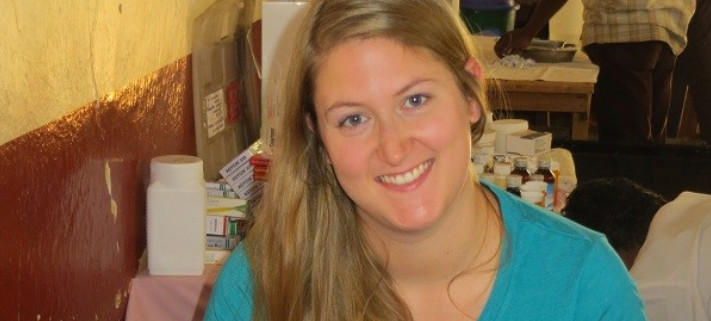Outside of your comfort zone
A nurse discovers what it’s like to go from a state-of-the-art hospital in the United States to a rural clinic in Africa.
John E. Holtz
Amanda Oswalt is getting what she prayed for: an experience outside of her comfort zone.
Amanda stepped out of the sparkling and sanitized hallways of St. Luke’s Hospital in Milwaukee, Wisconsin, one day and into the handmade brick-and-mortar, dark and dusty clinics in rural Malawi the next.
Could there be a more stark contrast in health care and facilities? Not from Amanda’s perspective: “It was such juxtaposition from where I came from and into what the medical reality is here.”
Just what are the medical realities in Malawi? Limited medications, long lines, little to no electricity, outdated equipment, insufficient funds, staffing shortages, cramped quarters, overcrowded rooms, and minimal pain management, just to name a few.
With such circumstances, just what is Amanda, the nurse-in-charge, to do? Lots, actually.
Since the Lutheran Clinic is mobile, the nurse-in-charge also needs to be! That means you often won’t catch Amanda at home. If you’d like to “shadow” her, you better have a good pair of walking shoes! Each clinic day Amanda opens up the pharmacy and helps ready the supplies: medications, scales, test kits, vaccines. Because water is not available at some of the clinics, Amanda also prepares several 20 liter containers to take for clinic use.
Amanda wasn’t loading medical supplies into 4×4 trucks in Milwaukee, but she is in Malawi! When the ambulance is packed up, they hit the road. Crammed like sardines in the Land Cruiser, Amanda and the national staff head off to work. No matter what time or how early they might arrive at the clinic site, scores of people will already be there waiting for them.
What do all these people—60,000 patients every year—expect from the Lutheran Mobile Clinic? They are looking for medical services, including family planning, under-five well-child checkups, HIV/AIDS testing, malaria testing, an out-patient department, and a pharmacy.
Amanda goes to the clinic on most days that it is open and makes sure that everything is running smoothly. While there, she often works in the pharmacy. The clinic closes after the last person is seen, but that’s not when Amanda’s work ends for the day. She and the staff head back home to Lilongwe, where they fill orders for medications and supplies needed for the next day.
What about the days that Amanda does not go to the clinic? One responsibility she has is medication procurement. She coordinates with the Malawian government to obtain medications. If they aren’t available through the government, Amanda purchases them from local pharmacies. Because many pharmacies have low or no supplies, that means a lot of running around the city in search of the much needed medications.
What about keeping records of all these people, meds, and treatments? That too is on Amanda’s plate. She reports back pertinent statistical data from the Lutheran Clinic to both the Malawian government (which gets the lion’s share of the data) and the Central Africa Medical Mission Committee in the United States.
The nurse-in-charge is counting pills, filling orders, packing supplies, solving personnel problems, buying meds, and writing reports. She doesn’t deliver babies in mud huts in the dark with just a flashlight clenched between her teeth. Nor does she perform C-sections with a Swiss Army knife, suturing splayed skin with Acacia tree thorns as needles. And Amanda is not out in the bush cutting out gangrene with no anesthetic or extracting imbedded worms and fly eggs from people’s flesh with a homemade tweezers.
Neither Amanda nor the national staff is doing such things. These are not the everyday situations in which they find themselves.
Patients mostly come to our Lutheran Clinic because they have coughs and colds, fevers and flu, aches in the head, and irritations on the skin. They suffer from rashes, burns, and cuts. Some women come because their bodies are getting worn out from bearing too many children. Others are faint with malaria. On any given day these people need a bandage, a pill, an antibiotic. They may need some ointment, a shot, or simple advice. Sometimes they need a referral to a hospital.
And they come to the Lutheran Mobile Clinic. Why? Because they know they will find a clinic that is run with care. They respect the staff because it is trained. They know they can get available medications.
What these same people may not realize is that there is a capable nurse-in-charge. She is fulfilling the responsibilities that are helping to make the clinic a success story of doing “good to all people, especially to those who belong to the family of believers!” (Galatians 6:10).
Amanda admits that living and working in a country such as Malawi does not come without its tough days. But it’s not crocs and elephants that give the nurse-in-charge her challenges. Instead, it’s a steady array of other things: prickly personalities, closed offices, clever thieves, intermittent electric power, and cultural differences.
Do such things cause Amanda to want to run? Yes, but not away from the clinic or the country. She runs to something else: the Lord and his promises! She treasures her “go-to” Bible verse that she’s kept close to her heart since she was young: “Trust in the Lord with all your heart and lean not on your own understanding; in all your ways submit to him, and he will make your paths straight” (Proverbs 3:5,6).
“These verses were my confirmation passage, and whenever I’m having a rough day or moment I tend to meditate on this passage,” says Amanda. “It always reminds me that he has the plan and I need to let go of my attempt of control and just trust.”
Ah, yes . . . trust. Blessed is the one who trusts, not in faith itself but in the object of our faith, our Lord Jesus Christ! We are weak but he is strong—strong enough to lean on whenever and wherever.
● Whenever the meds run low, the water runs dry, the patience runs thin, or one’s own sinful nature runs amok.
● Wherever you are, whether in a hospital in Milwaukee, a clinic in Malawi, a truck on the road, or a plane in the air.
The Lord is there with his love, his forgiveness, his peace—strong enough to lean on whenever and wherever.
Even when you are outside your comfort zone.
John Holtz, a missionary in Malawi, Africa, also serves as missionary-in-charge of the Lutheran Mobile Clinic.
The Lutheran Mobile Clinic began in Malawi in 1970. Nurses travel to five designated bush areas to set up a clinic for the day and then return to their home in Lilongwe by night. Permanent structures built to serve as clinics during the week are used as churches on Sunday. Two U.S. nurses serve alongside Malawian nationals in administering the clinic. These workers often provide spiritual hope as well as physical care. This clinic is part of the work of the Central Africa Medical Mission, which also runs a permanent clinic in Zambia. Learn more about this work at http://centralafricamedicalmission.info/
SUBMIT YOUR STORY
Do you have a manuscript, idea, or story from your own life you’d like to share for use in Forward in Christ or on wels.net? Use our online form to share it to our editorial office for consideration.
SUBSCRIBE TO FORWARD IN CHRIST
Get inspirational stories, spiritual help, and synod news from Forward in Christ every month. Print and digital subscriptions are available from Northwestern Publishing House.
Author: John E. Holtz
Volume 103, Number 2
Issue: February 2016
Copyrighted by WELS Forward in Christ © 2021
Forward in Christ grants permission for any original article (not a reprint) to be printed for use in a WELS church, school, or organization, provided that it is distributed free and indicate Forward in Christ as the source. Images may not be reproduced except in the context of its article. Contact us




